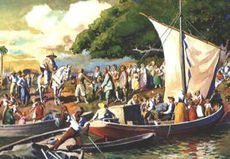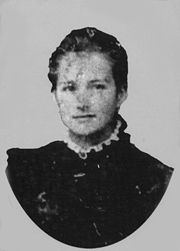
Revolt of the Muckers
Encyclopedia

Sapiranga
Sapiranga is a city in Brazil in the state of Rio Grande do Sul with a population of roughly 80,000 inhabitants. It is located in an industrial area called "Vale dos Sinos", by the Rio dos Sinos . The town's economy relies heavily on the shoe industry...
, Rio Grande do Sul
Rio Grande do Sul
Rio Grande do Sul is the southernmost state in Brazil, and the state with the fifth highest Human Development Index in the country. In this state is located the southernmost city in the country, Chuí, on the border with Uruguay. In the region of Bento Gonçalves and Caxias do Sul, the largest wine...
, Brazil
Brazil
Brazil , officially the Federative Republic of Brazil , is the largest country in South America. It is the world's fifth largest country, both by geographical area and by population with over 192 million people...
. It was a religious conflict led by Jacobina Mentz Maurer
Jacobina Mentz Maurer
Jacobina Mentz Maurer was a Brazilian religious leader. She led the Revolt of the Muckers that happened in a German community in Brazil.-Early life:...
, that happened in the years of 1873 and 1874, between two groups in a German community
German Brazilian
A German Brazilian is a Brazilian person of ethnic German ancestry or origin...
in Southern Brazil.
German settlement
Before emancipation in 1955, Sapiranga was considered the fifth district of São LeopoldoSão Leopoldo
São Leopoldo is an important Brazilian industrial city located in the south state of Rio Grande do Sul. It occupies a total area of 103.9 km² at circa 30 km from the State Capital, Porto Alegre. Climate is sub-tropical, with temperatures varying from 2°C minimum at Winter to more than...
. The whole region of Vale do Rio dos Sinos started to be settled by German immigrants
German Brazilian
A German Brazilian is a Brazilian person of ethnic German ancestry or origin...
on July 25, 1824. These Germans, mostly farmers, were brought by the Brazilian Government to populate this inhospitable area of Brazil. In the first 50 years of immigration, between 20 and 28 thousand Germans arrived, almost all of them for agricultural settlement. The first settlers were recruited by Major Antônio Jorge Schäffer and taken to the current town of São Leopoldo. The immigrants had to build their own house
House
A house is a building or structure that has the ability to be occupied for dwelling by human beings or other creatures. The term house includes many kinds of different dwellings ranging from rudimentary huts of nomadic tribes to free standing individual structures...
s, received seed
Seed
A seed is a small embryonic plant enclosed in a covering called the seed coat, usually with some stored food. It is the product of the ripened ovule of gymnosperm and angiosperm plants which occurs after fertilization and some growth within the mother plant...
s for planting and livestock for sustenance. From São Leopoldo, the Germans cleared the area, following the path of rivers. In some years, the whole region of Vale do Rio dos Sinos was being occupied by German settlers. In 1826 the first tannery was built in the valley. Next, wheat mills were built, a soap factory, tools, workshops, cutting of stones, and a huge number of shoes.
The Muckers

Germany
Germany , officially the Federal Republic of Germany , is a federal parliamentary republic in Europe. The country consists of 16 states while the capital and largest city is Berlin. Germany covers an area of 357,021 km2 and has a largely temperate seasonal climate...
to escape religious persecution. Jacobina's uncle, Libório Mentz built, in 1826, the first Protestant church of São Leopoldo. Gradually, Jacobina mingled religion with care to patients, through readings of biblical
Bible
The Bible refers to any one of the collections of the primary religious texts of Judaism and Christianity. There is no common version of the Bible, as the individual books , their contents and their order vary among denominations...
passages for patients. Soon, she was becoming famous for her miraculous meditations. Jacobina Mentz and her husband, João Maurer, founded a religious sect in Morro ferrabráz. On May 4, 1873, Jacobina promoted a congregation and an estimated 100 to 500 people were present. Jacobina was now treated as the reincarnation of Jesus Christ.
Jacobina ordered her followers to leave the church and the local school, because according to her the institutions were not teaching the true gospel anymore. This attitude irritated the religious members and a large part of the community that was not following Mentz. Then, the community was divided into two: those who joined Jacobina were known as Mucker (German
German language
German is a West Germanic language, related to and classified alongside English and Dutch. With an estimated 90 – 98 million native speakers, German is one of the world's major languages and is the most widely-spoken first language in the European Union....
for "False Saint") and those who were against Jacobina were known as Spotter (debauchee). Among those against Jacobina were Karl von Koseritz, the founder of the Deutsche Zeitung Newspaper of Porto Alegre
Porto Alegre
Porto Alegre is the tenth most populous municipality in Brazil, with 1,409,939 inhabitants, and the centre of Brazil's fourth largest metropolitan area . It is also the capital city of the southernmost Brazilian state of Rio Grande do Sul. The city is the southernmost capital city of a Brazilian...
and diverse Lutheran Priests. The clashes led to the arrest of the leaders of the movement by local police, who were later released at the request of the President of the Province of Rio Grande do Sul. On December 10, 1873 João Maurer, along with two other members, went to then Brazil's capital, Rio de Janeiro
Rio de Janeiro
Rio de Janeiro , commonly referred to simply as Rio, is the capital city of the State of Rio de Janeiro, the second largest city of Brazil, and the third largest metropolitan area and agglomeration in South America, boasting approximately 6.3 million people within the city proper, making it the 6th...
, to deliver a petition to the Emperor Pedro II
Pedro II of Brazil
Dom Pedro II , nicknamed "the Magnanimous", was the second and last ruler of the Empire of Brazil, reigning for over 58 years. Born in Rio de Janeiro, he was the seventh child of Emperor Dom Pedro I of Brazil and Empress Dona Maria Leopoldina and thus a member of the Brazilian branch of...
, complaining of police harassment, beatings and insults to the moral heritage of other settlers. Representatives of the Empire requested explanations from the authorities of Rio Grande do Sul on the case.
On May 24, 1874 a great religious service was held in Ferrabraz, where Jacobina announced the end of the world and ordered the extermination of 16 enemy families. On June 15 the massacre of the Kassel family occurred. An arrest warrant
Arrest warrant
An arrest warrant is a warrant issued by and on behalf of the state, which authorizes the arrest and detention of an individual.-Canada:Arrest warrants are issued by a judge or justice of the peace under the Criminal Code of Canada....
was issued for the Maurer couple. On June 25, 14 houses of the Muckers' enemies were burned and 10 people were killed, including children. Soon there were several conflicts between the Muckers and the Spotters, resulting in violence and several deaths. On June 28, the police
Police
The police is a personification of the state designated to put in practice the enforced law, protect property and reduce civil disorder in civilian matters. Their powers include the legitimized use of force...
attacked, but the Muckers won the conflict. This contributed to belief in the divinity of Jacobina. After another failed attack, Jacobina succeeded in escaping and hiding in Ferrabraz. The end of the conflict occurred on August 2 of that year, when a traitor, Carlos Luppa, led the police to the hideout of Jacobina Mentz, who was killed along with the majority of Muckers. The Muckers that survived were tried and released or absorbed on June 16, 1880. Even after Jacobina's death, there are records of the presence of Muckers as late as 1897 and 1898. On October 23–24, 1897 three people were killed and the crime was attributed to the Muckers led by Aurélia Maurer, the daughter of Jacobina. In 1898, a group of 100 Germans murdered 5 Muckers in the region of Nova Petrópolis
Nova Petrópolis
Nova Petrópolis is a municipality in the Southern Brazilian state of Rio Grande do Sul. The main town and seat of the municipality is also called Nova Petropolis. It is located in the Serra Gaúcha region, at 29º22'35" South, 51º06'52" West, about 100 km north of Porto Alegre, the state capital city...
and Lajeado.
Filmography
In 1978, filmmaker Jorge Bodansky reproduced the Revolt of the Muckers in the film Os Muckers (in GermanyGermany
Germany , officially the Federal Republic of Germany , is a federal parliamentary republic in Europe. The country consists of 16 states while the capital and largest city is Berlin. Germany covers an area of 357,021 km2 and has a largely temperate seasonal climate...
, it was named Jakobine). In 2002, filmmaker Fábio Barreto reproduced the Revolt in the movie A Paixão de Jacobina, with actress Letícia Spiller in the lead role.

